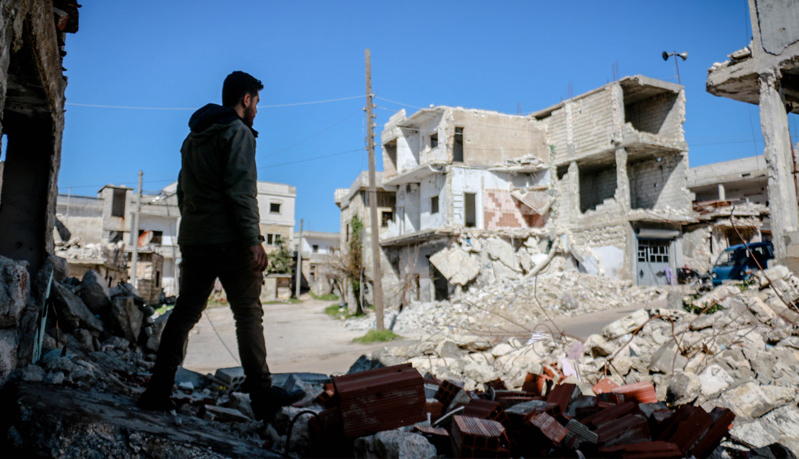
As Christmas approaches, the situation in Syria is particularly challenging for displaced believers. Many are struggling with physical and emotional hardships, separated from their families and church communities. Christians in Syria comprise around 10% of the population (2.3 million).
A call to prayer
The global church is called to pray for the safety of Syrian Christians and other vulnerable groups as they navigate this period of uncertainty. Intercede for the protection against the threats posed by extremist groups, asking for God’s guidance and provision for those on the frontline by offering support.
Let us all remember our Syrian brothers and sisters in faith this Christmas.
Let us all remember our Syrian brothers and sisters in faith this Christmas. Pray with them in solidarity, that their hope will be strengthened as they endure these immense challenges.
They have faced significant persecution, particularly from extremist groups like HTS (Hayat Tahrir al-Sham) and its predecessor, Jabhat al-Nusra. These groups have subjected Christians to forced conversions, extortion, violence, and displacement.
An uncertain future
The Christian community in Syria is diverse, representing various denominations, yet they all face the same growing uncertainty—what is their future in Syria?
The abduction of Christian leaders during the Syrian Civil War highlights the dangers for the community. Furthermore, there were many more Christian leaders and civilians that were killed—numbers that have been left unaccounted for in the media.
In 2013, Greek Orthodox Archbishop Paul (Yazigi) and Syrian Orthodox Archbishop Gregorios Yohanna Ibrahim were kidnapped, allegedly by forces loyal to HTS. To this day, their fate remains unknown.
With HTS now in control of Syria following the removal of President Bashar al-Assad, the future for Christians and other minority groups has become increasingly perilous. While many Syrians celebrate Assad’s downfall, the rise of HTS has created new fears.
This shift in power has heightened the risk of violence and displacement for Christians.
HTS is a former affiliate of al-Qaeda. It aims to establish an Islamic state governed by strict Islamic principles. This shift in power has heightened the risk of violence and displacement for Christians, Druze, Alawis, and other religious minorities. HTS has a long history of targeting Christians and other minorities through acts such as kidnappings, killings, and property confiscation, deepening concerns about the uncertain and challenging future of these communities.
A country in Crisis
Syria remains in the grip of a long-running humanitarian crisis.
Around 7.2 million Syrians remain displaced within the country. Beyond Syria’s borders, 4.9 million refugees—many of them Christians and other minorities—live in neighboring countries like Turkey, Lebanon, and Jordan. Initially, some countries offered a warm welcome, but attitudes have shifted over the years. Refugees now face rising hostility, forced deportations, and increasing pressure to return to Syria.
HTS: a threat to religious minorities
HTS is recognised as a terrorist organisation by the UN, Australia, the US, and other countries, though some governments (like the UK) have hinted that they may reconsider this designation. Emerging from a merge of rebel groups, HTS officially split from al-Qaeda in 2016. Despite this separation, its ideology remains rooted in Islamist extremism.
HTS seeking to establish an Islamic state, claiming to align with Islamic values, is likely to bring suffering to all religious minorities, especially Christians. Again, the group has a record of violent attacks, kidnappings, and systematic persecution of Christians, including confiscation of their property and killings of civilians.
The refugee crisis and hidden persecution
Millions have already fled, and with the recent escalation, many more Christians, Druze, Ismailis, and other religious minorities are continuing to flee every day. In neighboring countries, refugees often hesitate to register with organisations like the UNHCR due to fears of sectarian violence. Many go to great lengths to hide their identities, living in constant fear of being targeted based on their faith or communities ties.
May the Prince of Peace be Emmanuel to Syrians in these days, readliy found by those who would seek the One upon whom we can cast all our anxieties.
Originally published by Philoi Global. Republished with permission.
Jude Simion is CEO of Philoi Global and serves on the Core Leadership Team of Refugee Highway Partnership. Philoi Global responds to the humanitarian gaps of persecuted minorities through relief, relocation, and resettlement; cultivating compassion, unity, and support for the displaced.





